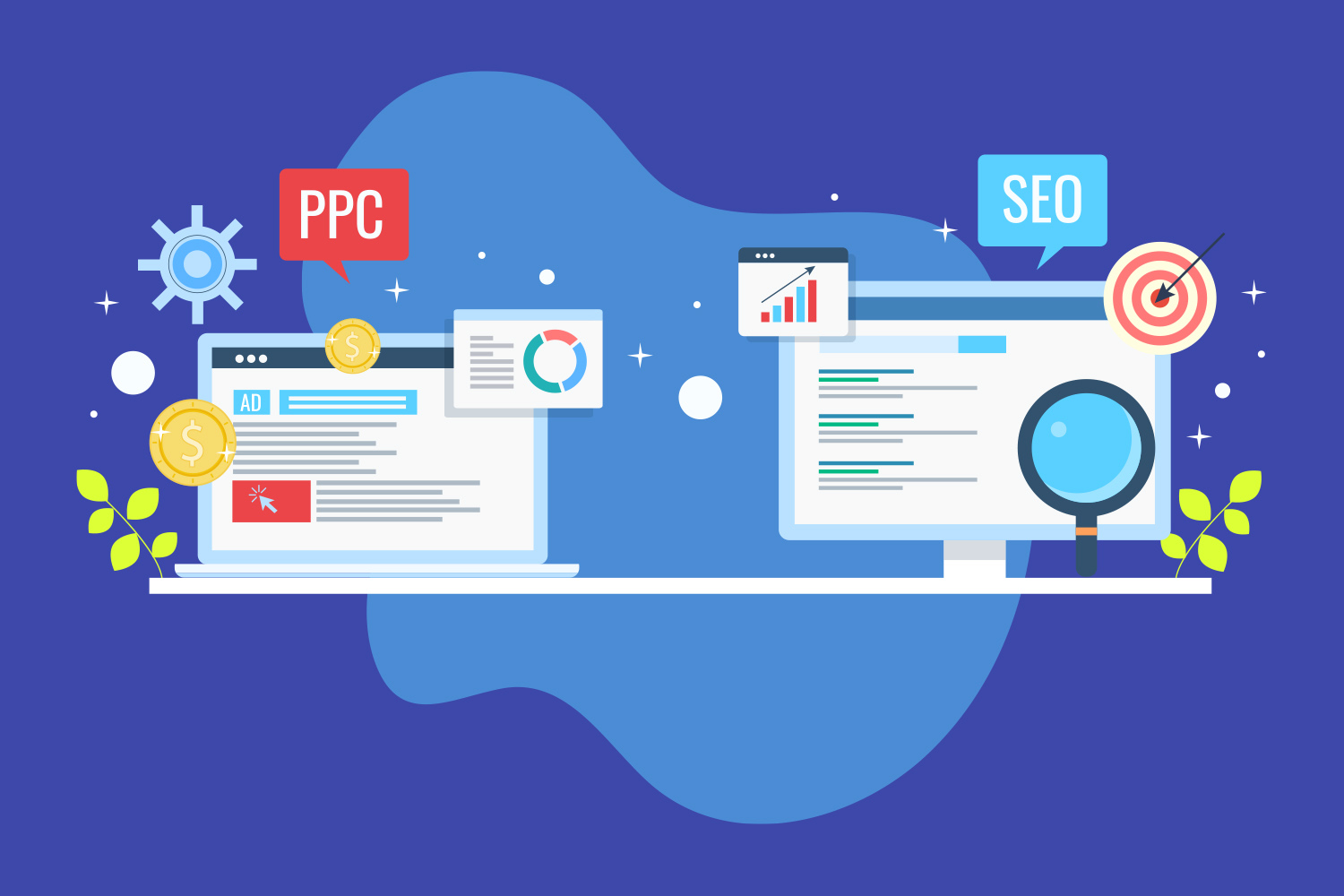PPC & SEO: How Top Agencies Blend Paid & Organic Search to Boost ROI
Every business that employs the use of a marketing agency has one shared goal: to boost revenue and ROI, and this means there’s often a toss-up between organic vs paid search when determining contracts and the best use of budget. Any agency worth its salt will tell you that for optimal results, you should be looking at both strategies.

SEO and PPC are very different marketing approaches, but few people realise that they actually influence each other indirectly. This is why we expertly combine both approaches for our clients whenever we can, and we’re going to explain the reason why we do this.
Organic vs paid search: what’s the difference?
Most people know that organic marketing typically takes the form of SEO and social media, whereas paid search relates to PPC campaigns and paid social media. Whilst it’s obvious that one is paid for and one isn’t, there are a few other differences between organic and paid search that need to be highlighted, as it’s these differences that often make the two strategies work well together.
|
|
Organic Search / SEO |
Paid Search / PPC |
|
Type of Rankings: |
Organic |
Paid |
|
Traffic: |
Slowly built over time |
Immediate |
|
Results Time Frame: |
3-6 months minimum |
Immediately |
|
Main Function: |
Improve visibility/brand awareness |
Improve revenue/sales |
|
Overall Cost: |
Little to none (if done in-house) |
Expensive upfront (depending on budgets) |
Overall, organic search is more of a long-game, requiring patience and persistence. It doesn’t need to cost a lot if you know what to do (check out our SEO Basics guide for more information on getting started), but it is an ongoing process and any drop in momentum can see immediate negative results. SEO is also composed of both creative and technical strategies, making it multi-faceted.
In comparison, paid search is a short-term marketing tactic that can yield results almost instantly. It can quickly get expensive, especially if you’re not using your budget in the most efficient way, but is something that mostly only requires a one-time setup (read more on how to do this with our Beginner’s Guide to PPC). PPC is generally less creative and more instantaneous, making it a good option if you’re seeking a quick win.

Not sure if SEO and PPC could work for you?
Call us today to discuss your goals and learn more about how to kickstart your digital marketing campaign.
How do organic and paid search complement each other?
A large part of why marketing agencies always try and implement PPC and SEO strategies side by side is because they cover more ground and complement each other well, working in ways that neither can do alone.
Essentially, what SEO misses, PPC can cover, and vice versa. Any successful business will need long-term gains and authority, and SEO does just that. On the other hand, a lot of businesses want to see an immediate return on their investment so they can continue to fund their marketing campaigns, and PPC provides the revenue to do that.
Implementing both strategies means users have two ways of finding you, ensuring you’ve covered all your bases. In an increasingly competitive market, this is essential, especially when you’re trying to better your brand awareness and build customer loyalty.
In the words of Jack Johnson, where paid and organic search are concerned, it’s always better when we’re together.
Subscribe to our free monthly newsletter.
How to leverage SEO and PPC together
So, PPC and SEO go together like fish and chips, but how the advantages of both can be leveraged isn’t something a lot of agencies shout about. We’re all about sharing knowledge and teaching marketing, whilst offering our services to those who need some help or don’t have the infrastructure to do it themselves. With this in mind, this is how we combine the two strategies to get the most out of our client’s campaigns, as well as some of the key advantages combining the two can have.
1. Cover more space on SERPs
The first way they work together is by covering more ground on SERPs. For example, if you want to rank for the search term “Eco appliances” (or whatever service or product you sell), it bodes well to have a PPC campaign around this term. With the right bid and strong ad copy, your ad could show up at the very top of Google when someone searches for that phrase – a good place to be if your ad is linked to a product and you have a revenue KPI to meet.
However, ads aren’t the be all and end all. According to Techjury, 94% of users skip Google ads in favour of the organic rankings which sit below the ads. This doesn’t mean people don’t click on PPC ads (they most definitely do), but many users will search for an organic result, too. This is why SEO matters. If you manage to nab a paid spot at the top of SERPs and an organic spot just below the ads, you’re covering more ground and will reap the rewards through a higher CTR.
2. Track and share keyword insights
Both SEO and PPC rely on keywords, but finding the right keywords that draw in users can be tricky. Due to SEO being such a long-game, the last thing you want is to build a campaign around a keyword or keyphrase that attracts little to no attention, but you won’t know if this is the case until months have passed.
With PPC, results are almost instant. You can test out target keywords on PPC campaigns and see what sort of traffic, if any, they bring in and monitor the conversion rate. You can then use this data to inform your SEO strategy and build a campaign around something that you know will resonate with your audience.
3. Optimise content to increase clicks and conversions
We’ve said it before and we’ll say it again, content is king. There are lots of aspects that go into making an SEO campaign successful, with meta data being one of them. Meta data is what appears in SERPs and what ultimately convinces people to click on your organic search result – no pressure.
Meta data is something that is often overlooked but that can directly impact your CTR and consequently your conversions, so it needs to be just right. Luckily, meta data is somewhat similar to ad copy. If you have an ad that is performing well with a good CTR, the ad copy can be used as meta data for a relevant page. Based on your performance metrics, you’ll know if it’ll be a success, but odds are, if it works for ads, it’ll work for organic search.
4. Build brand awareness and familiarity
Brand awareness and loyalty are what keep businesses going, but in a seemingly infinite sea of competitors, achieving that can be troublesome. How do you make sure your brand is the one that people remember? Well, aside from some clever branding techniques, you essentially need to make sure that you’re everywhere all at once.
The more people see your brand come up, the more they’ll be inclined to try your services. PPC and SEO in tandem give you maximum coverage, as mentioned before. Not only this, but if someone sees your brand via an ad and then again organically, they’ll recognise it, and vice versa. This is how awareness is built, and ultimately how you attract new customers and retain the ones you already have.
Final thoughts
PPC and SEO together are a match made in heaven, so don’t be surprised if you approach an agency to do one and they push for you to do both. Odds are it’s not a money grab, it’s because they yield maximum results and can really amplify your digital presence and elevate your brand to the next level.
If you would like to learn more about how we blend PPC and SEO into a wider, more cohesive strategy, arrange a free consultation with us today.
Related Services
Who we are
The Brains is an award-winning digital marketing agency, consultancy and training provider in London.
Our Brains are experts in their field, helping companies grow faster, generate leads and overtake competitors.
What we do
Our Brains can help you with everything from ongoing marketing to training up your internal teams.
Give us a call to discuss your needs.

